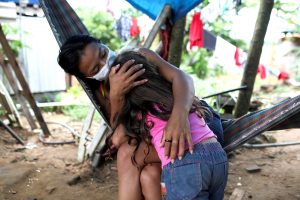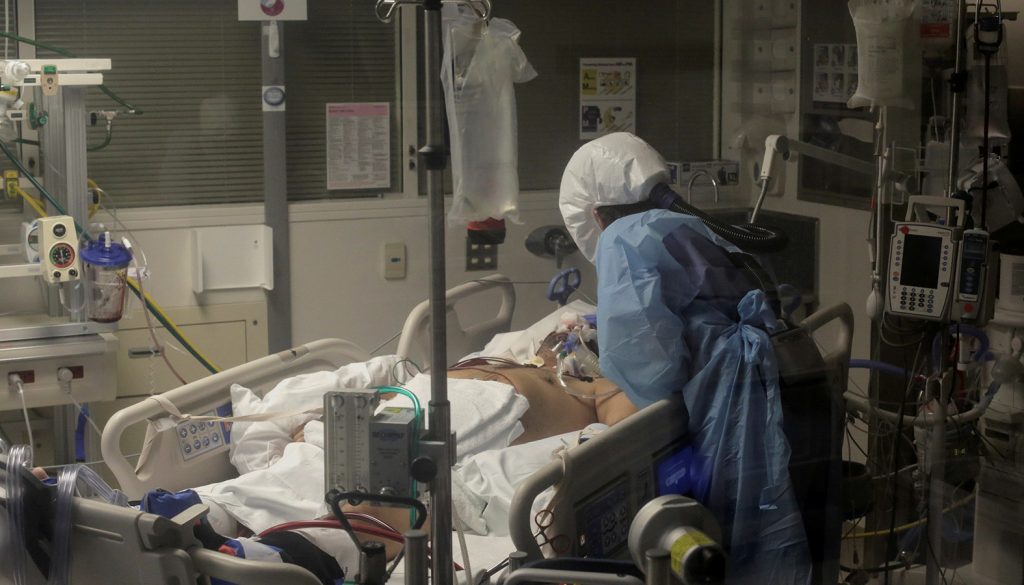When the novel coronavirus (COVID-19) first hit earlier this year, I was working as a clinical instructor teaching nursing students. Soon after, school closed, students went home, and I was looking for work. Now I’m a nurse in an ICU taking care of our most acutely ill patients. It is some of the most taxing work I’ve ever done.
Those who are incredibly sick are hardly recognizable as living: Their fingers and toes are black, because the same medications we use to maintain a blood pressure and perfuse their vital organs kills living tissue. Extremities swell into disfigured shapes. The skin weeps fluid, and sores form.
Many of my patients can’t breathe. Instead, a machine does that for them. Even the seemingly simple act of turning them onto their stomachs (known as “proning”) is a desperate and dangerous “Hail Mary” move that can go one of two ways: improve their lung function or kill them.
Sometimes these patients get a little better, but usually the best we can do is stave off death for a time.
What might be surprising, however, is that not a single one of my patients has COVID-19.

One of the few certainties of life is that we all will die. We can only affect the timing, and not even in all cases. COVID-19 is a genuinely scary infection, but the reality is that we’re still much safer from communicable diseases than past generations.
Still, COVID-19 has reminded us like nothing in our lifetime of that simple truth: You and I could die tomorrow. Death is uncomfortable to think about, and modern American life seems specially designed to distract us as much as possible from the inescapable reality of our own mortality.
Now, thanks to COVID-19, it seems we can't forget or push it aside, even if we want to. That’s part of what makes COVID-19 terrifying. The insulation provided by our comfort zones and methods of distraction has been stripped away, and we’ve been forced to see the raw truth of our own mortality, as well as that of our family members and neighbors.
As Christians, we aren’t spared from this reality, but neither should it scare us. Our own Catechism invites us to ponder death daily: “Every action of yours, every thought, should be those of one who expects to die before the day is out” (CCC 1014).
As a nurse, I’ve been face-to-face with death for years. I’ve performed CPR until ribs have cracked and slammed epinephrine in an attempt to jumpstart a dead heart. I’ve participated in successful “codes,” but more often than not, I lose that battle.
When the time of death is announced in the hospital , everyone stops for a single moment. We are all confronted by the reality of life’s final destination and our own inability to stop the inevitable. But it is only a moment. There are other patients who still need us. Everybody buries their physical and emotional exhaustion and unceremoniously leaves, except for the patient’s nurse, who is responsible for notifying the family.
But exposure to death doesn’t actually help you conquer fear; it only numbs you to it. You either develop a thick skin or you burn out.
That is, unless a greater power spares you.
Our Christian faith gives new meaning to death even to the point of calling it a “blessing.” Having seen firsthand what avoiding death at all costs — long past natural human endurance — looks like, eternal rest in Christ must certainly be a mercy.
But Jesus doesn’t promise merely to put an end to our suffering. To die in Christ Jesus is better “than to reign over the ends of the earth,” said St. Ignatius of Antioch.
Or consider the words of St. Teresa of Ávila: “I want to see God and, in order to see him, I must die.” Or St. Thérèse of Lisieux, who said, “I am not dying; I am entering life.”
Death, the saints remind us, isn’t the end; it’s a beginning.
Pope Francis tells us not to fear death. COVID-19 can take our bodies, but “it is the death of the heart” caused by sin that we must be most vigilant against, he has said.
This pandemic should be a challenge to us: to cast aside the shadow of fear and instead don the mantle of love. It’s a time to embrace the sacraments and follow Christ with more fervor than we did before the pandemic began. The final destination of our bodies is already predetermined. The destination of our souls is not.

